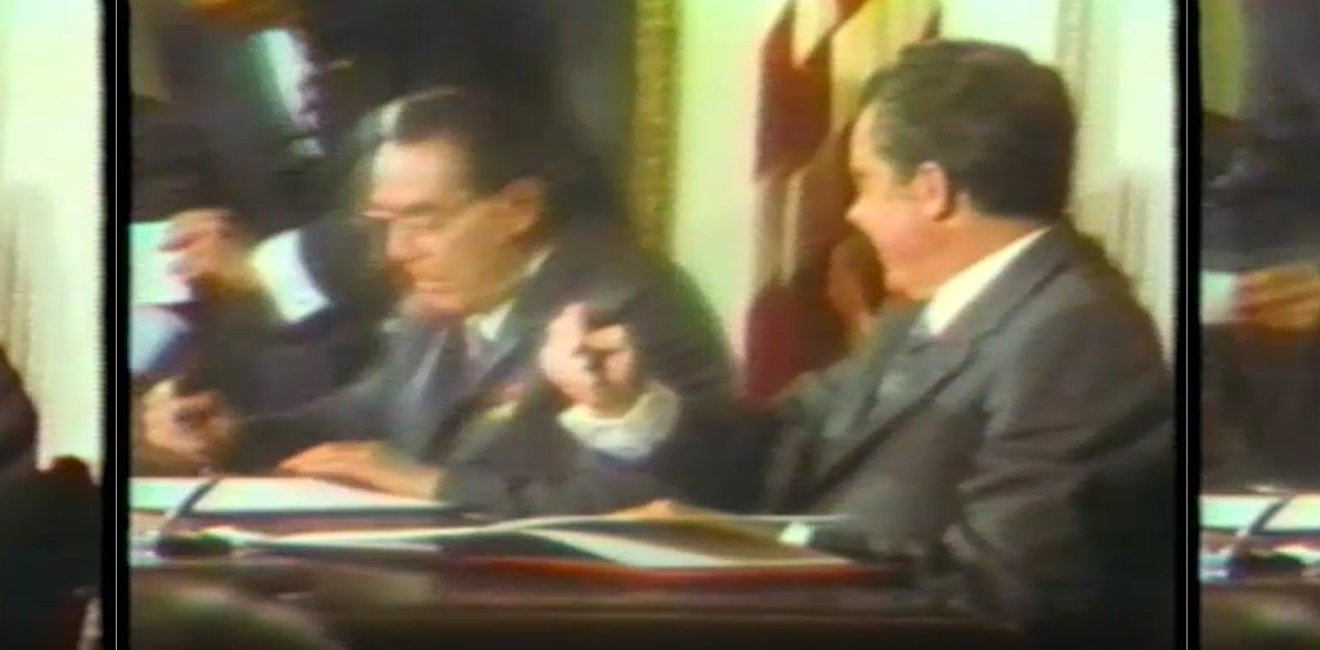Almost fifty years ago, US President Richard Nixon and Soviet leader Leonid Brezhnev sat side-by-side in the White House preparing to sign documents.
Suddenly, Brezhnev leaned forward and jabbed a document with his pen, turning to see Nixon’s reaction. The smile on Nixon’s face grew to a grin. Then Nixon jabbed a document.
For five seconds, the two men repeatedly jabbed pieces of paper, laughing and feigning fierce competition.
Spectators — diplomats, politicians, aides — broke into laughter and then applauded.[i]
Outside the White House, of course, competition was far from feigned. The two nations had struggled for a quarter century of Cold War to avoid catastrophe.
The next morning, The New York Times reported: “President Nixon and Leonid I. Brezhnev signed an agreement to try to avert confrontations that could lead the United States and the Soviet Union into a nuclear war either with each other or with any other country. The accord, negotiated in secret for more than a year, was disclosed yesterday morning.”[ii] Laughter was not mentioned.
Based on a series of similar episodes (and despite critics), Brezhnev clearly deserves a full measure of credit for helping the two super powers maintain détente.
His partner in laughter, President Nixon, often expressed delight and respect for Brezhnev’s jovial behavior. “Whenever possible, I acted as his straight man on these occasions, but it was sometimes difficult for me to balance politeness against dignity.”[iii]
Dignity? An unfortunate choice of a word, perhaps, given the nature of Nixon’s departure from office, which was, of course, no laughing matter.
To be sure, humor can breach the strictest rules of diplomacy. For scholars alert to infractions, Brezhnev was often a leading suspect.
“In playing his role,” observed one recent biographer, “Brezhnev ‘hammed’ somewhat by taking liberties that were not only untypical of a Soviet party leader but also broke with the etiquette of diplomacy.”[iv]
The paths running between history and public policy rarely lead through laughter.
Yet when they do, humor makes its own kind of impact.
Konrad Adenauer, for example, used humor to take his seat in history. After the Second World War, he met with a group of fellow Germans working to create a political party that would run their new country.
Ordinarily aloof, Adenauer walked to the front of the room and announced, “I was born on 5 January 1876, so I am probably the oldest person here. If nobody objects, I will regard myself as president by seniority.”
The group erupted in laughter. Nobody objected and with their continuing consent, Adenauer led his Christian Democrat Union and his nation for more than a dozen years of the Cold War.[v]
The sound of laughter must have been deafening at still another post-war meeting of German politicians. On March 1, 1946, some 1,000 politicians met inside the State Opera House in Berlin. The fear in the West was that Soviet operatives would secretly control their German allies. When Otto Grotewahl, the East German Communist leader, announced that the German Communist party “would act free of Soviet direction, he offered as proof the recent dissolution of the worldwide Communist International, “the whole audience roared with laughter,” apparently in derision and disbelief.[vi]
Searching other realms, it is not surprising, perhaps, to discover that humor rarely (if ever) surfaces in warfare. Yet it arose in 1986 in a remote Nicaraguan jungle.
A captured American mercenary, Eugene Hasenfus, was being questioned by a Sandinista government judge. I was there as the pool reporter for dozens of journalists assigned from around the world to cover the secret US military operations which became known as the Iran-Contra scandal.
Standing amid thousands of pieces of wreckage of the cargo plane from which he had parachuted, Hasenfus was asked, essentially: Is this the aircraft by which the United States is supplying weapons to forces illegally attempting to overthrow the legitimate government of Nicaragua?
“Yes,” he replied, pausing. “But it sure looked different the last time I saw it.” The judge was not amused, but I saw smiles and heard mild chuckles from a few of Hasenfus’s English-speaking captors. Tension seemed to lessen.
Hasenfus was convicted and sentenced to 30 years in prison yet soon released to return to the United States. His humor was not cited, but I cannot forget it.[vii]
It seems important to recognize that laughter does not always reflect humor. One of the best examples stems from the Cold War Cuban Missile Crisis and was televised live to the country.
In the 1962 United Nations debate, the American ambassador, Adlai Stevenson, confronted his Soviet counterpart, Valerian Zorin, with a series of questions phrased as accusations.
Ambassador Stevenson: “Do you, Ambassador Zorin, deny that the USSR has placed and is placing medium and intermediate range missiles in sites in Cuba? Yes or no. Don’t wait for the translation. Yes or no.”
The audience of diplomats laughed, nervously, for 11 consecutive seconds.[viii]
More laughter, lower in volume, arose as Stevenson’s questioning grew more insistent and Ambassador Zorin replied: “I am not in an American courtroom sir. So therefore I do not wish to answer a question that is put to me in the fashion a prosecutor does. In due course you will have your reply.”
Ambassador Stevenson pressed for an answer: “To world opinion right now, and you can answer yes or no. You have denied that they exist, and I want to know if I’ve understood you correctly.”
Ambassador Zorin (Interpreter): You will have your answer in due course. Continue your statement please. You will receive the answer in due course. Do not worry.”
Ambassador Stevenson: “I am prepared to wait for my answer until hell freezes over if that’s your decision, and I’m also prepared to present the evidence in this room.”[ix]
This episode strongly suggests that some outbursts of laughter are driven by fear. Brezhnev, however, identified other actions he used to win attention and confidence.
“As he explained to his ambassador,” writes biographer Suzanne Schattenberg, “it was very much his intention to draw attention to himself with such stunts.” She quoted Brezhnev: “People will almost certainly remember something unplanned. Otherwise, I’m just jumping from one event to another as if programmed.”
Schattenberg added: “He sought, then, to break out of the corset-like role that was imposed upon him, a role that suppressed his spontaneity and closeness to the people. Nixon too had to endure it when he hosted him at the White House.”[x]
In a memoir, Nixon described a familiar Brezhnev tactic:
“As we came to the end of the front line of troops [forming the guard of honor] and were able to walk by the rear ranks, Brezhnev could no longer suppress his animation and joviality. He waved enthusiastically at the spectators, who were applauding and waving American and Soviet flags, and then strode over to them just like an American politician working the crowd at a county fair. He shook hands with several people and grinned broadly as they reached out to him until I reminded him that we had to finish the ceremony. As we walked back to the South Portico, he threw his arm around my shoulder and said, ‘See, we’re already making progress!’[xi]
Questions remain. Can humor or a feeling of genuine kinship play a discernible role in making history? Certainly there are examples worth examining.
In 1977, four years after his resignation, Nixon was asked to assess the man with whom he had shared three productive summit meetings.
“With Brezhnev,” Nixon told British journalist David Frost,” you had a man not as quick as Khrushchev, a man far better mannered, not as rash as Khrushchev, more cautious, a man who consults with people before acting, and in that way, a much safer man to have sitting there with his finger on the button.” [xii]
It should be noted that Brezhnev’ did not limit his humor to diplomats and politicians. In 1966, an American businesswoman, Bettina Parker, was representing a a US communications equipment company at a trade fair in Moscow. Standing beside her exhibit, she spotted Brezhnev making the rounds. “I walked up to him and I introduced myself,” she recalled to author Grace Lichtenstein, a New York Times reporter. “I had spent a lot of time putting the show together and I was not going to let the biggest dignitary in the country pass me by. Would you?”[xiii]
By Parker’s account, the two developed a friendship over several years. In 1982, as a journalist preparing an obituary of the Soviet leader, who was near death, I interviewed Parker at her home in Chicago. I asked her what she would remember most about her friend. "He was a very strong man,” she said simply, “tremendous presence, very confident, very personable, and a great sense of humor.”[xiv]
Based on these examples in history, laughter’s ability to ease tension might seem a certainty, although not what we might call “scientific certainty.” It doesn’t seem likely that political scientists will soon devise an“ Adenauer Rule” to advise when a politician may crack a joke as a means of assuming leadership.
Yet the positive effect of humor on events in society clearly merits our attention. Brezhnev’s antics that day in the White House nearly 50 years ago deserve our applause and gratitude as diplomats and politicians still strive to preserve peace in a world struggling with danger.
[i] ABC News, Leonid Brezhnev: A Personal and Political Obituary. Nightline, Nov. 10, 1982, Television News Research Archive, San Diego State University.
[ii] The New York Times, Page One News Summary June 23, 1973
[iii] Suzanne Schattenberg, Brezhnev: The Making of a Statesman (2021) B. Tauris Books, London 2021, Pg. 305
[iv] Schattenberg (2021), op cit Pg. 351
[v] Charles Williams, Adenauer: The Father of The New Germany, Pg 112-113, Quoted in Henry Kissinger, Leadership: Six Studies in World Strategy, Penguin Press 2022, Pg 9
[vi] Christian Ostermann, Between Containment and Rollback: The United States and the Cold War in Germany 2021, Woodrow Wilson International Center for Scholars, Pg 102
[vii] Author’s pool press report, Managua, Nicaragua, October,1986 (not available)
[viii] United Nations Debate, Cuban Missile Crisis, 93-second excerpt, Oct. 26, 1962, YouTube14 Author’s interview, Bettina Parker, ABC News Nightline, op cit. Nov. 10, 1982, Television News Research Archive, San Diego State University
[ix] U.N. Debate, ibid
[x] Schattenberg, op. cit. Pg. 308
[xi] Richard Nixon, RN: The Memoirs of Richard Nixon, Amazon Kindle (1978) Pg. 1036
[xii] Nixon-Frost Interview, 1977 excerpt, ABC News Nightline, Nov. 10, 1982Television News Research Archive, San Diego State University
[xiii] Grace Lichtenstein, Machisma: Women & Daring, Doubleday, Garden City, N.Y., 1981, Pg 216
[xiv] Author’s interview, Bettina Parker, ABC News Nightline, op cit. Nov. 10, 1982, Television News Research Archive, San Diego State University






